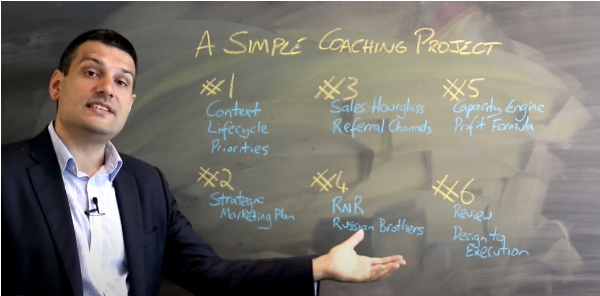What is Business Strategy anyway? In Blackboard Fridays Episode 30, Jacob talks about Growth Planning. Need this implemented into your business? Talk to the international business advisor who can do exactly that – Contact Jacob, Learn More, or Subscribe for Updates.
Here’s a great rule for testing the quality of business strategy: what’s on the list of ideas you said ‘no’ to?
Too many business owners confuse inspiration and innovation with ‘saying yes to every great idea’. Let me assure you: that way lies madness.
As you build your team, of course, strategy becomes more complicated. You need to document it, to communicate it, to be a coach and mentor to your team … and maybe even have a coach or mentor yourself to stay true to your vision and the roadmap that will take you there.
Learn more about advisory and strategy here in this week’s episode.
And if you love business strategy – or fear you’re saying yes to too much and implementing too little – then join me next Tuesday for a live webinar and Q&A session. Details and registration are here.
Who is Jacob Aldridge, Business Coach?
“The smart and quirky advisor who gets sh!t done in business.” Back independent since 2019.
Since April 2006, I’ve been an international business advisor providing bespoke solutions for privately-owned businesses with 12-96 employees.
At this stage you have proven your business model, but you’re struggling to turn aspirations into day-to-day reality. You are still responsible for all 28 areas of your business, but you don’t have the time or budget to hire 28 different experts.
You need 1 person you can trust who can show you how everything in your business is connected, and which areas to prioritise first.
That’s me.
Learn more here. Or Let’s chat.
Transcript
Good day and welcome. One of the most common questions I receive, as someone who talks an awful lot on videos like this about business strategy, is what they actually mean by business strategy?
Indeed, as a business owner who’s bombarded by messages telling you that you need to be working on the business not in the business that you need to be thinking strategically, what is business strategy for you?
I’ve got a simple definition that does have a few moving parts. For me, business strategy is a set of ordered priorities will take your business from where you are now to where you want to be in the future, the full understanding of why you are in business and underpinned by commercial reality.
Let me walk through those in order. So firstly, it’s a set of ordered priorities. So, strategy is not just a list of things that we need to do. It’s not getting all the leadership team, the business owners, the heads of department together and doing a big, long to-do list.
You’ve got to sit down and say, ‘these are the specific projects that are priorities in our business now and once we’ve done those then we will do the next set and the next set after that and the next set after that.’
Most businesses I talked to can easily see two maybe three phases ahead. You don’t necessarily have to see every step along the way, but you need to have those strategic priorities in order; otherwise, you and your team are going to be trying to do everything at once which means you’re not going to be able to execute fully properly any of them.
Great business strategy is also what you say no to. It’s those ideas that while they might make perfect sense don’t fit into that strategic roadmap. When you look at the orders in which you’re going to do things, the orders in which you’re going to grow your business, they don’t fit in they don’t make sense and so you say no to them, you get those out of your head space.
It needs to be those ordered priorities. Now to help you design those, you need to understand where your business is now. How you measure that is going to differ it, might depend a little bit on your business model, and to a degree how large a vision you have will depend on what measurements you see for your business now.
Some of the key things that are common across most businesses are things like, how many staff you’ve got? What kind of revenue turnover you’re achieving? Some of the gross and/or net profit margins that you’re managing and to a degree how you as the business owner are feeling about the business today and the potential for the business in the future.
Defining your business now, allows you to define your business for the future in a comparative sense. So, you’re comparing apples to apples, instead of thinking about the business today is frustrating and the business of the future is being 100-million-dollar turnover, you can break down some of those specifics. We need to go from 12 to 96 staff. We need to go from 1.5 million in revenue to 50 million in revenue. We need to go from no profit to a million dollars a year in profit.
One interesting thing that I’ll throw in there, is whenever I hear round numbers like 100 million builders in turnover or a million dollars in profit, I know that the business owner hasn’t really done those ordered priorities. They haven’t broken down the specifics.
If you’ve got an idea of now, you need to be honest about that vision. There’s no point leading yourself on, or your team on with the vision that you think analytically might excite them. Speak from the heart.
Don’t get caught up in comparative of your vision with other businesses because there’s no value in comparing your business to Apple or Google, any more than there is comparing your business to a one-man band who’s struggling to break even. The only business that matters when it comes to defining your vision is your business.
Sharing that, which will have an emotional element, is a great way to make sure you’ve got the right team on to help you underpin all of those ordered priorities. So, you’ve got the roadmap of audit priorities from where the business is now to where it wants to be with full understanding of why you are in business.
What is your purpose, your mission, your bigger picture your why call it, what you will what is it that drove you to start this business? If you say was profit, if you say was making more money, then I would challenge you to ask yourself that question again because nobody I have ever met is genuinely in business just for the money.
There’s something about your passion for business ownership, for independence, for freedom, or for your industry, for your client, something there that drives you to do this instead of just going and taking a high-paying job. That why maybe quite personal, quite cultural, internal to the business.
Your why might be more external it’s something that fits into your brand but you’re clear about it it’s documented and if I went in and our three of your team members why this business existed, each of them would give me the same answer. So why you’re in business informs that vision and the steps that are going to get you there.
Lastly, it needs to be underpinned by commercial reality. There’s no point thinking that you’re going to grow your business by a thousand percent without needing to invest. That you’re going to go out there and be able to hire all the best people without having some compelling reason why they would work for you over other options that they might have.
This is one of the critical things that I often find particularly in early-stage businesses, maybe they’re in start-up, maybe they’re towards the end of the start-up journey, and just starting to see that scalable mountain ahead of them. They haven’t yet quite got the head around some of the commercial realities that are going on. They think that if they just hope and wish hard enough, it’s going to land in their lap.
The reality is you as a business owner are going to need to take risks. You’re going to need to make investments in time and staff, in money to implement those priorities to get you to where you want to go.
If you don’t have the commercial underpinning of that journey, then things aren’t going to get implemented, targets are not going to be achieved, your vision is not going to be realized, and you are going to be disappointed and letdown.
What is business strategy? It’s the strategic roadmap of ordered priorities, what am I going to do to go from where I am now to where you want to take the business in the future, with a full understanding of why you are in business and underpinned by those commercial realities.
Have you got all of that in place in your business? If not, reach out. I’d love to help you fill the gaps so that you can get to where you want to be sooner.
Next Steps
Want to learn more about how this can apply to your business? It costs nothing to chat:
- Email me jacob@jacobaldridge.com (I read them all)
- Call, Text, or WhatsApp me +61 427 151 181
- Or just Subscribe https://jacobaldridge.com/about/subscribe-to-jacob-aldridge-com/ to stay in touch




